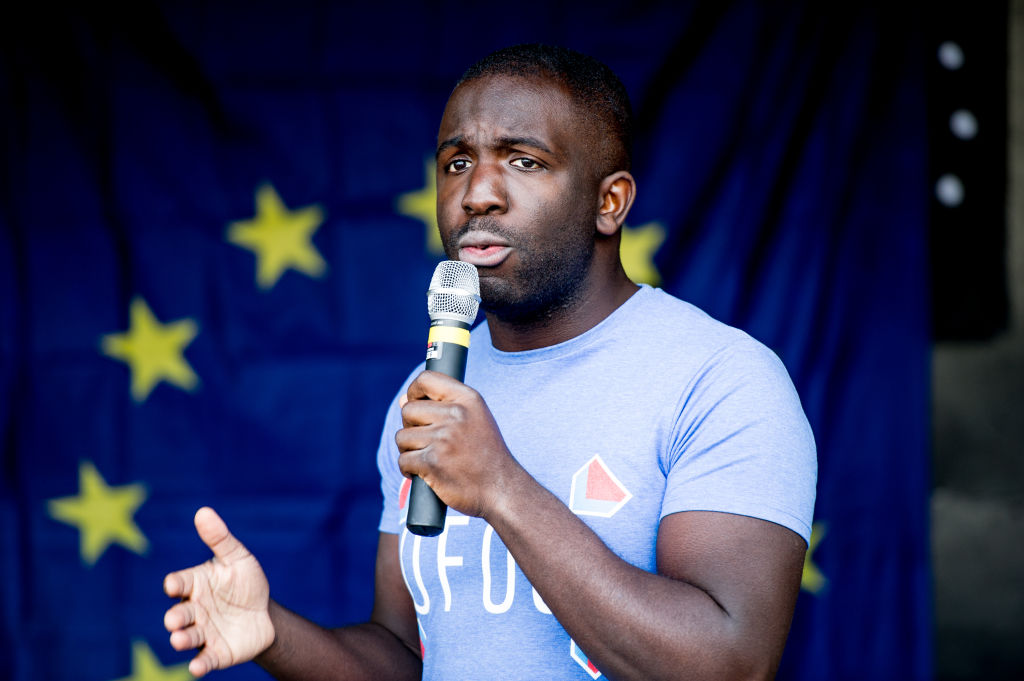Q&A with Femi Oluwole: ‘I had some pretty dark thoughts after Brexit’
Femi Oluwole was working for a human rights NGO in Brussels when the Brexit referendum was called. So disillusioned was he with the quality of debate among politicians and the media that he decided to move back home to Solihull to launch the youth-centred pro-European Union advocacy group Our Future Our Choice.
In June 2016 he went to the Bullring centre in Birmingham, bought a T-shirt from Primark, wrote “EU questions? Just ask” on it with a marker pen and stood in the city centre for two days, engaging passers-by in conversation about the upcoming Brexit referendum. At the time he had less than 50 followers on Twitter. That figure has now grown to more than 360,000 and his smart, punchy videos calling out the government for its hypocrisy on everything from welfare cuts to climate change have become a regular fixture on social media.
What was the catalyst for your political activism?
I wasn’t really that politically aware as a child, other than a poem that I wrote about the Iraq War when I was 12, basically calling out both George Bush and Tony Blair. I think one of the lines was, “and his puppy with lots of hair comes in the form of Tony Blair”.
I studied law because I like to argue, and French because I was good at it. But then I figured, I don’t want to be a lawyer, because if you want to change the system, you need to change the rules, and lawyers simply play within the rules. And not all the rules have a solid moral basis. So I ended up doing internships in Brussels for various NGOs. I was working alongside British members of the European Parliament to try and stop arms sales to Saudi Arabia, and so I saw the EU as this protector of the moral integrity of the UK. I was involved in what I considered to be a battle for the soul of the UK long before I even heard the word Brexit.
How hard was it to come to terms with the result of the referendum?
I remember on the 12 December 2019, I was in the car park at Solihull station, about to get the train down to London for the election. And I just sat there and cried because I realised we were about to lose. After the election, there was a period of significant depression. It was never along the lines of “It was a waste of time.” It was more a personal thing, that this was probably the biggest change I could have ever made in my life, if I managed to succeed, so is everything else going to be less than that? And so I had some pretty dark thoughts, but I came out of it just in time to hit a global pandemic! So yeah…
What do you see as the most pressing political issue facing us right now?
The most urgent is the policing bill. That will effectively remove our right to protest, because once you say that any police chief on the scene can subjectively decide that [a protester] is making people feel uneasy, then you cannot go to a protest and know that your actions will not be retrospectively deemed illegal, which effectively criminalises all protests. And if we lose the right to protest, then any other rights we lose can no longer be protested for.
As for the biggest issue, that’s proportional representation. It’s that simple. The Tories have been in power for about two thirds of the last 70 years. And this is despite the fact that parties to the left of the Tories have had the majority of the vote in all but three elections – 1955, 1958 and 2015. In recent years Labour and the Lib Dems have needed the SNP and Greens to make up that majority but, generally speaking, we do not vote rightwing. However, the Tories stay in power.
Your weekly fact check of PMQs for the Citizens is proving incredibly popular. Why do you think this is?
Simply fact checking Boris Johnson is never going to be enough because there are too many lies to counter. It’s not just about deceiving people. It’s about undermining the very concept of truth, so that it doesn’t matter whether or not it’s a lie. It’s just the fact that we’re saying it and we’re saying it with the loudest voices and more of us are saying it than on the other side. It’s a populist idea of truth. And so it’s not enough to just correct him. You have to explain why he’s telling you this lie. Here’s what he’s actually trying to achieve with that misinformation.
Is it worthwhile to point out ministerial untruths when there are no consequences for lying?
That’s why the biggest issue in the country is changing the voting system. If we still have the notion of safe seats, then there are no consequences. If you know that, no matter what, you’re going to go back to a constituency that hasn’t voted Labour for decades, do whatever you want. That’s why political apathy comes about, because people know their votes don’t mean anything.
What’s giving you reason for optimism right now?
If you look at the fact that the majority have voted for parties to the left of the Conservative party at almost every election since the Second World War, [it shows] we have a progressive voting country. The opportunity to have a sustainably progressive parliament and politics is there for the taking. The question is, can those parties on the Left work together?
Also, the Gen Z-ers are more progressive than we are. We’re already seeing it with the climate strikes. Once they start having some money and the political power to make a difference, things are going to change quite quickly. We have to hope for better things.

